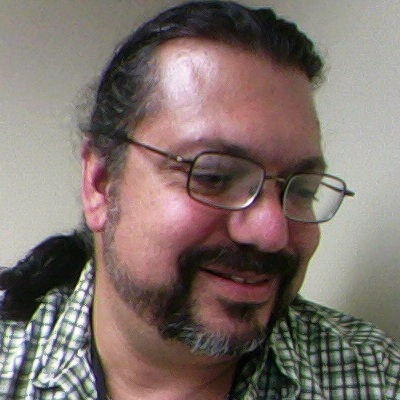Raymond Fast
Playwright~Author
Workshops
Raymond Fast has been a writer for over thirty years. During that
time, he has picked up a few things about the craft both experientially
and under the instruction of capable teachers and mentors. And with over
twenty years experience as a public communicator and instructor, he's well
equipped to share what he's learned in a classroom
setting.

Raymond has developed the following workshops and conducts them periodically in association with Onion Man Productions' educational program. When scheduled, these workshops can be found listed on OMP's website and are announced through other online media. If you are interested in a workshop and would like to know when it will next be conducted, contact Raymond Fast or James Beck, Onion Man Productions Managing Director. Also, if you would like a workshop to be scheduled for a particular group, arrangements can be made in your area. Contact Raymond Fast or James Beck for details.
Shut Up and Write: Giving Your Characters (Only) Great Dialogue
Polishing Your Play: Final Steps to Make Your Script Sparkle
A Playwright's Journey: First Steps
Shut Up and Write: Giving Your
Characters (Only) Great Dialogue
4 hours (3-hour version available)
Synopsis: Bad dialogue delivered well is only slightly less bad. Actors can only deliver great dialogue if they have great dialogue to deliver. The responsibility for great dialogue rests completely on the playwright. The good news is, great dialogue is fairly easy to write. The hard part is not writing bad dialogue. "Shut Up and Write: Giving Your Characters (Only) Great Dialogue" looks at what makes great dialogue great and, more importantly, addresses how to rid your script of the bad dialogue that will bury your greatness in mediocrity.
Topics:
The roles of actors
and the director in delivering dialogue
The
playwright's responsibility for creating great dialogue (and eliminating
bad dialogue)
The tools of the story teller
and how they apply to writing for the stage
The qualities of great dialogue (and what makes bad
dialogue)
Creating subtext
Action as dialogue
Silence as
dialogue
Developing character's
voice
Excersizes: This is a writing-intensive workshop. Participants will engage in several exercises through which they will start with a story and create a scene, using additional tools and techniques for writing great dialogue in each step.
Preparation: Participants should arrive with plenty of paper and something to write with.
Note: This workshop is designed for writing plays, however it will serve any form of creative writing involving dialogue.
Polishing Your Play: Final
Steps to Make Yor Script Sparkle
2.5 hours
Synopsis: Any great chef will tell you that you taste your food three times. First with your eyes, then with your nose; by the time you get that first bite past your lips, you're already well into the experience. Most diners are oblivious to the first two sensations. Yet take away the eye-tasting and the nose-tasting, and a diner will know the meal just wasn't great. Good, maybe, but not great. The differences between a good play and a great play can be subtle, but great plays don't just happen. "Polishing Your Play" is a writing-intensive workshop that offers several techniques for addressing those subtle details that can make a good play truly great.
Topics:
Getting the script out of your
head by getting your head out of the script
Why, how and when to
relinquish direction of your play to your director
Cutting great lines that just
don't belong in your script
Checking for and establishing
continuity in your script
Refining characters and
voices to distinction
Exercises: This is a writing-intensive workshop. Participants will engage in several exercises through which they will apply a series of tools and techniques to refining their scripts.
Preparation: Participants should arrive with paper and something to write with. Each should also have a printed draft of a ten-minute play, or an eight to ten page excerpt from a longer play that is near its final draft. This copy will be marked up. It is recommended that participants not read this script for at least two weeks prior to the class.
Note: This workshop is designed for writing plays, however it will serve any form of creative writing.
A Playwright's Journey: First
Steps
Two 3 hour sessions (Act I and Act II, 6 hours total)
Synopsis: So you've decided to be a playwright. As with any journey, you need a plan. And before you can make a plan, you need to know where you are, where you want to be, what you're going to have to navigate along the way, what resources are available to you, and how to use them. Through this workshop, you will find where you are, decide where you want to be, and learn some of the resources available to you and how to use them.
Topics:
Act I
Assessing your motives as a
playwright
Assessing your writing style
Acquiring and
utilizing resources to develop as a playwright
including methods and techniques for acquiring and managing time,
financial, human, organizational and other
resources
Acquiring and utilizing
resources to develop your play
Finding and creating
opportunities for public and private readings
Making the most out of a
reading
Planning and organizing your own public or private
reading
Act II
Finding and selecting
submission opprotunities
Knowing when your play is ready for submission
Preparing a synopsis
Preparing your
resume
Preparing a bio
Promoting yourself and your play
Working
with producers, directors, and
actors
Contracts
Exercises: This is a discussion-intensive workshop with relatively few written exercizes (but lots of notes).
Preparation: Participants should arrive with plenty of paper and something to write with. A packet of handouts will be provided as well.






